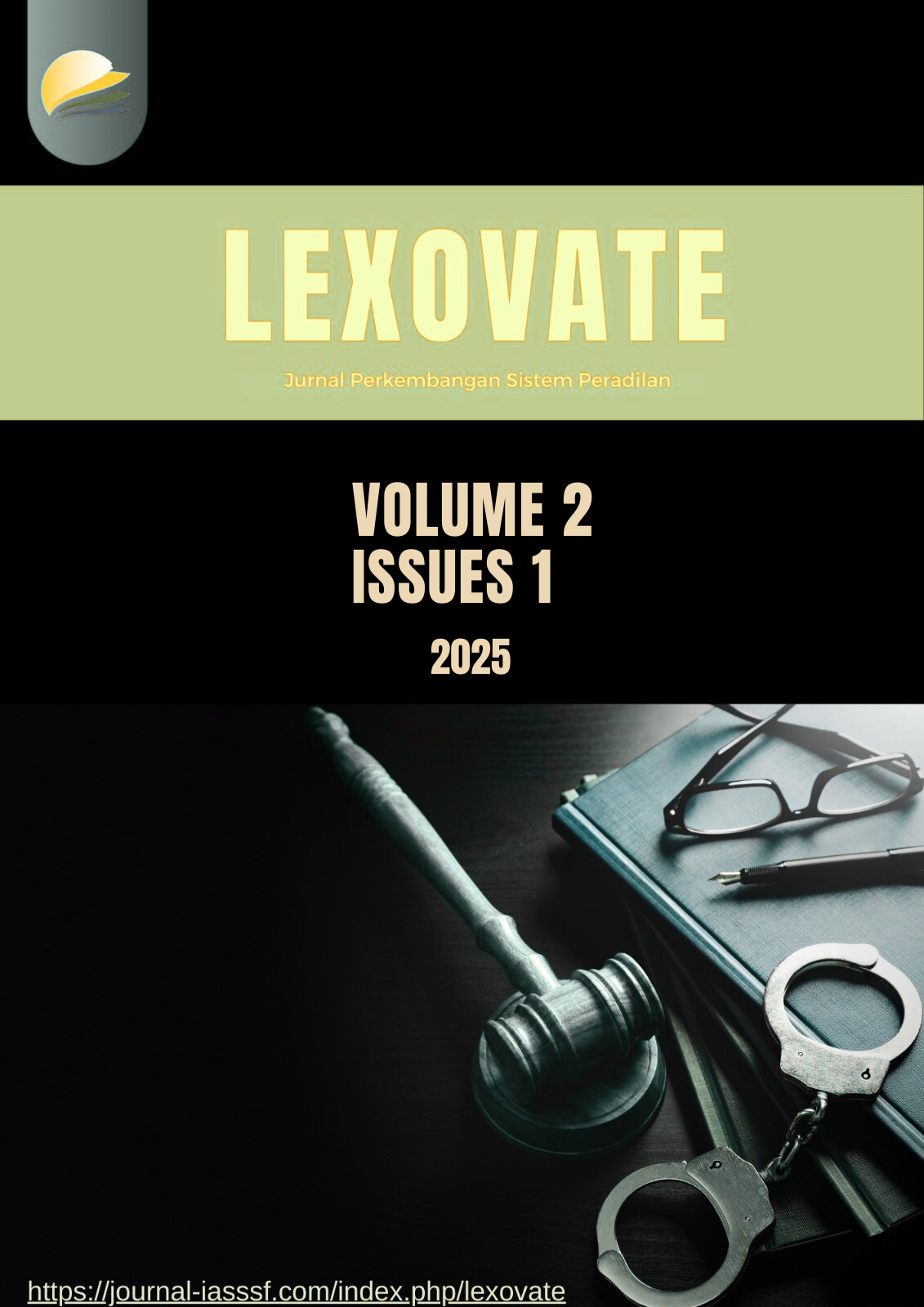Legal implications of debt transfer (cessie) in syariah banking: A case study of decision No. 1922/Pdt.G/2020/PA.Btm
Keywords:
civil law, debt transfer (cessie), islamic law, pacta sunt servanda, syariah bankingAbstract
Background: The issue of debt transfer (cessie) in Islamic banking has raised legal questions, particularly regarding its conformity with Syariah principles. A case, Putusan No. 1922/Pdt.G/2020/PA. Btm, examines a dispute where a bank transferred a debt to a third party after the debtor failed to make payment, highlighting concerns about the legal validity of such transfers under Islamic law. Methods: This research utilizes a qualitative legal analysis approach by reviewing the case judgment of Putusan No. 1922/Pdt.G/2020/PA. Btm, relevant Fatwas, including Fatwa DSN-MUI No. 31/DSN-MUI/VI/2002 on debt transfer, and the Civil Code regulations. The study examines the legal basis of debt transfer within the scope of Islamic banking practices and the application of the pacta sunt servanda principle, comparing it with existing regulations on debt transfer under both conventional and Syariah law. Findings: The court’s ruling in this case declared the debt transfer to be invalid, as it contradicted Syariah banking principles. The case revealed that the transfer from an Islamic bank to an individual in the conventional sector was incompatible with Islamic financial regulations. The study found that while the civil law allows such transfers, the Islamic law framework, as outlined by National Sharia Council - Indonesian Ulema Council/Dewan Syariah Nasional - Majelis Ulama Indonesia (DSN-MUI) Fatwa, does not support this practice. This inconsistency points to a broader issue of alignment between civil law and Islamic banking regulations in debt-related transactions. Conclusion: The research concludes that debt transfer (cessie) must be assessed within both civil and Islamic banking frameworks. The case highlights the need for adherence to pacta sunt servanda and Syariah compliance, as the bank's debt transfer violated Syariah principles, rendering it invalid. Novelty/Originality of this article: This article analyzes the legal conflicts between Islamic law and civil law on debt transfer, focusing on the challenges of harmonizing Syariah banking principles with Indonesia's national civil law system.
References
Abasimel, N. A. (2023). Islamic banking and economics: concepts and instruments, features, advantages, differences from conventional banks, and contributions to economic growth. Journal of the Knowledge Economy, 14(2), 1923-1950. https://doi.org/10.1007/s13132-022-00940-z
Adlini, M. N., Dinda, A. H., Yulinda, S., Chotimah, O., & Merliyana, S. J. (2022). Metode penelitian kualitatif studi pustaka. Jurnal Edumaspul, 6(1), 974-980. https://doi.org/10.33487/edumaspul.v6i1.3394
Amiruddin, A. Z. (2006). Pengantar Metode Penelitian Hukum. Raja Grafindo Persada.
Aravik, H., Hamzani, A. I., & Khasanah, N. (2021). The role of the state in the Islamic economic system: A review of Abbas Mirakhor's thought. Islamic Banking: Jurnal Pemikiran Dan Pengembangan Perbankan Syariah, 7(1), 1-22. https://doi.org/10.36908/isbank.v7i1.271
Assyakurrohim, D., Ikhram, D., Sirodj, R. A., & Afgani, M. W. (2022). Metode studi kasus dalam penelitian kualitatif. Jurnal Pendidikan Sains Dan Komputer, 3(01), 1-9. https://doi.org/10.47709/jpsk.v3i01.1951
Benuf, K., & Azhar, M. (2020). Metodologi penelitian hukum sebagai instrumen mengurai permasalahan hukum kontemporer. Gema Keadilan, 7(1), 20-33. https://doi.org/10.14710/gk.2020.7504
Harahap, M. A., & Sudiarti, S. (2022). Kontrak Jasa pada Perbankan Syariah: Wakalah, Kafalah dan Hawalah. Reslaj: Religion Education Social Laa Roiba Journal, 4(1), 42-53. https://doi.org/10.47467/reslaj.v4i1.482
Hardiati, N., & Januri, J. (2021). Al-Hiwalah Dan Implementasinya Pada Perbankan Syariah Ditinjau Dari Kaidah Fiqih. Syntax Idea, 3(1), 6. https://doi.org/10.46799/syntax-idea.v3i1.932
Ikbal, M., & Chaliddin, C. (2022). Akad Murabahah Dalam Islam. Al-Hiwalah: Journal Syariah Economic Law, 1(2), 143-156. https://doi.org/10.47766/alhiwalah.v1i2.896
Imayanti, N. S. (2021). Hukum Perbankan Syariah Konsep dan Regulasi. Sinar Grafika.
M. Anwar, S., Junaidi, J., Salju, S., Wicaksono, R., & Mispiyanti, M. (2020). Islamic bank contribution to Indonesian economic growth. International Journal of Islamic and Middle Eastern Finance and Management, 13(3), 519-532. https://doi.org/10.1108/IMEFM-02-2018-0071
Malik, A., Ullah, K., Jan, S., Atiq, M., & Abdullah, A. (2021). The role of knowledge diffusion in evolving governance principles for Islamic banking. International Journal of Islamic and Middle Eastern Finance and Management, 14(4), 835-850. https://doi.org/10.1108/IMEFM-07-2020-0325
Mardotillah, H., Fatimah, E., Adilah, E. R., & Nurfani, F. (2021). Implementasi Akad Hiwalah Dalam Lembaga Keuangan Syari’ah. Journal of Indonesian Comparative of Syari'ah Law, 4(2), 148-161. https://doi.org/10.21111/jicl.v4i2.7152
Muhaimin. (2020). Metode Penelitian Hukum. Mataram University Press.
Nofiardi. (2021). Sengketa Ekonomi Syariah Penyelesaian Hukum di Pengadilan dan Lembaga Keuangan. Pusaka Media.
Nofrianto, Erba, D. M. F., Lestari, R. E., & Harahap, M. R. P. A. (2022). Kerangka Regulasi dan Fatwa Transaksi Akad Hawalah Pada Perbankan Syariah. Al-Mizan (e-Journal), 18(1), 99–122. https://doi.org/10.30603/am.v18i1.2544
Nurhadi, N. (2019). Teori Hukum Progresif Dalam Menyelesaikan Sengketa Bisnis Perbankan Syariah. Jurnal Hukum Samudra Keadilan, 14(2), 154-167. https://doi.org/10.33059/jhsk.v14i2.1372
Nurhasanah, N., & Adam, P. (2017). Hukum Perbankan Syariah: Konsep dan Regulasi. Sinar Grafika
Oslami, A. F. (2022). Kedudukan Pengadilan Agama dan Basyarnas dalam Menyelesaikan Sengketa Ekonomi Syariah. At-Tasyri': Jurnal Ilmiah Prodi Muamalah, 14(1), 27-40. https://doi.org/10.47498/tasyri.v14i1.860
Padmasari, W. (2018). Perlindungan Hukum Bagi Para Pihak Dalam Pengalihan Piutang (Cessie) Melalui Akta Notaris. Jurnal Hukum Dan Kenotariatan, 2(2), 264-275. https://doi.org/10.33474/hukeno.v2i2.1509
Rachman, A. (2022). Dasar hukum kontrak (akad) dan implementasinya pada perbankan syariah di Indonesia. Jurnal Ilmiah Ekonomi Islam, 8(1), 47-58. https://doi.org/10.29040/jiei.v8i1.3616
Riaz, U., Burton, B., & Fearfull, A. (2023). Emotional propensities and the contemporary Islamic banking industry. Critical Perspectives on Accounting, 94, 102449. https://doi.org/10.1016/j.cpa.2022.102449
Rifa’i, Y. (2023). Analisis Metodologi Penelitian Kulitatif dalam Pengumpulan Data di Penelitian Ilmiah pada Penyusunan Mini Riset. Cendekia Inovatif Dan Berbudaya, 1(1), 31-37. https://doi.org/10.59996/cendib.v1i1.155
Sari, E. P. (2022). Penyelesaian Sengketa Kenotariatan Melalui Upaya Mediasi oleh Notaris. Jurnal Multidisiplin Indonesia, 1(3), 944-952. https://doi.org/10.58344/jmi.v1i3.89
Suadi, A. (2021). Cessie, subrogasi, novasi, dan hawalah: dalam penyelesaian sengketa ekonomi syariah. Kencana.
Wahab, M. A. (2019). Teori Akad Dalam Fiqih Muamalah. Rumah Fiqih Publishing.
Zaeni, A. (2021). Penyelesaian Sengketa Ekonomi Syariah Di Pengadilan Agama. Riset Buku.
Zaeni, A. (2018). Hukum keperdataan: Dalam perspektif hukum nasional, KUH Perdata, hukum Islam, dan hukum adat. PT RajaGrafindo Persada.
Downloads
Published
Issue
Section
Citation Check
License
Copyright (c) 2025 Uswatun Hasanah, Endang Widuri

This work is licensed under a Creative Commons Attribution 4.0 International License.





